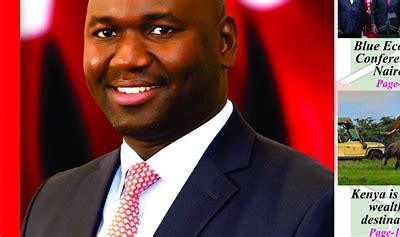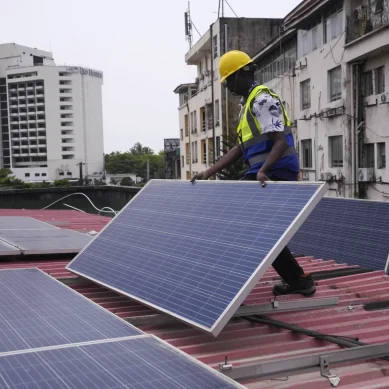
While Target 16.9, the UN’s Sustainable Development Goals (SDGs) calls for the provision of a digital legal identity for all, including newborns, by 2030, there are fears that the initiative maybe abused for surveillance by Big Tech companies.
According to California-based privacy attorney Greg Glaser, “The UN’s SDG Target of 16.9 confirms that governments will be issuing everyone biometric ID by the year 2030, including babies … That means the UN is partnering with corporations and local governments to issue you and your children a biometric ID by 2030, whether you want the IDs or not.”
In a tweet, Julius Kibet Bitok, Kenya’s principal secretary for immigration and citizens services, said, “The digital identity system will provide Kenyans with a secure and reliable way to verify their identity for a variety of purposes, including accessing government services, opening bank accounts and travelling. It will also help to reduce fraud and corruption, and improve efficiency.”
Ngare questioned that theory. “On face value and if the government is the holder of the data and not third parties such as Microsoft or its minors, it may improve service delivery and reduce fraud as stated by government operatives,” Ngare said, adding that he doubted this would be the case.
Similarly, Alexis Hancock, director of engineering for the Electronic Frontier Foundation says, “If [digital ID is] done correctly, a factor of convenience may benefit people from having to travel long distances for renewing important documents, or issue temporary credentials as they await their official documentation. There are other methods, like ‘selective disclosure,’ where you do not have to display the entirety of your information but only what is required for a certain transaction.”
Hancock said she was concerned about how a “long-term, persistent identifier” could “be used to track people and create a surveillance state or be compromised over time by a bad actor looking to leak information tied to these unique identifiers.”
“Every time a digital ID holder uses their ID, there is an opportunity for the ID issuer and the ID verifier to gather personal data about the ID holder,” she added.
According to Biometric Update, “As the government seeks to win the trust and confidence of the population with regard to the Maisha Card, it has also clarified that its issuance will not be compulsory,” but will instead be accepted as proof of legal ID alongside existing identification documents.
Yet, a separate Biometric Update report states, “A two-to-three-year transition is planned, with legacy national IDs being phased out.”
Hancock said she prefers “ephemeral IDs for transactions and the ability to discard them or change them when they get compromised.” She is “also concerned about mandates around digital ID and it possibly leading to a permanent structure for state-level surveillance.”
“People should have the ability to opt-out of digital first systems and a right to paper if they are not comfortable,” Hancock said.
Similar claims regarding optionality had been made about India’s Aadhaar digital ID programme, according to The Economist, which wrote, “Although Aadhaar was supposed to be optional, it is hard to function without it.”
The Kenyan government claims the implementation of Maisha Namba is also intended to bring the country into compliance with international standards on global travel as determined by the International Civil Aviation Organization and other agencies.
Maisha Namba is funded with a budget of Ksh1 billion (approximately $6.8 million), Biometric Update reports. The programme was initially set to launch on October 2, according to Business Daily Africa, but its rollout was postponed on September 29
According to Reclaim the Net, Kenyan officials “stress that the new system is aimed at addressing a host of issues such as the authentication of citizens, protection of primary identification documents, improved governance of social programmes and operations and simplification of access to services such as healthcare, education, taxation and social security,” but public concerns may have contributed to the postponed launch.
“Despite these concerns, government officials have made attempts to assure its citizens of their commitment to privacy protection and the inclusivity promised by the Maisha Namba,” Reclaim the Net added.
Glaser called into question such claims of “inclusivity.”
“‘Inclusivity’ is … a fake talking point politicians use on camera,” he said. “The reality is that biometric ID brings everyone down to the lowest common denominator of government welfare recipients … Inclusivity is political-speak for the government forcing itself on your family and treating your children like wards of the state.”
Glaser also criticised public-private partnerships. “As I researched biometric ID, I learned that governments are not at the top of the food chain. It’s actually private companies at the top — such as Microsoft, Oracle, Accenture — because they create and own the technology and they manage the data at the top.
Kenyan officials have sought to reassure the public that their personal information would be safe on the new digital platform.
Kenyan National Registration Bureau Registrar for the Kipipiri region, Joel Muchunu, said the Maisha Namba programme will incorporate advanced security features, including cryptographic technology for data security, Kenya News Agency reported.
Irungu Houghton, executive director of Amnesty International, “applauded” the Maisha Namba programme and the Kenyan government’s digital transformation efforts, according to Biometric Update, but “raised concerns about the safety of data that will be collected for the Maisha Namba scheme” and said it is important Kenyans are “comfortable they understand and are aware of the opportunities of this digital platform.”
Such reassurances have not convinced all Kenyans, however. According to Reclaim the Net, “There is an evident wave of skepticism,” with activists from certain regions “expressing concerns about inadequate infrastructure, unreliable network access, and privacy and civil liberties concerns.”
Some activists argued that the Maisha Namba is indistinguishable from a previous digital ID effort attempted by the Kenyan government, the Huduma Namba, according to Kenyan outlet The Star. That programme was declared unconstitutional by Kenya’s High Court in October 2021, for conflicting with the country’s Data Protection Act.
Ngare said Huduma Namba “failed because [the government] intended to include DNA.”
Other activist groups, led by the Kenyan Human Rights Commission, are “calling for a stronger legislative basis” and “warn of the possibility of discrimination and the erosion of privacy,” warning that public engagement has been “lacking,” as have “procedural and legal safeguards,” Biometric Update reported.
Other activists “accused the government of backtracking on its promise to do away with vetting for persons seeking identification cards” and claimed “rogue government officials were using the vetting exercise to demand bribes,” according to The Star.
Kenyan officials claimed the country “is lagging behind” in digital implementation, “putting Kenya at risk of non-compliance with international enforcement agencies’ standards.”
Ngare said the Kenyan public at large isn’t highly familiar with Gates, but those who are familiar with him “are very worried and suspicious.” He said there isn’t extensive opposition to Maisha Namba “because at face value, it sounds like a good idea.”
“Most people don’t know the dark side of Bill Gates and his link to the depopulation agenda,” he said. “To the beneficiaries of the NGOs [non-governmental organisations] his foundation supports and some beneficiaries of his philanthropy, he is admired. To those who know the deeper undertones of the eugenics agenda, he is loathed.”
According to The Financial Times, Gates “acknowledges that digital ID could be abused,” saying that “Anything that makes the state more effective is good for the things you like the state to do, and bad for the things you don’t like the state to do.”
“But, if you believe in a state that should provide you education and should let you vote and should give you health services, there’s got to be some notion of, ‘Who are my citizens and are they eligible for this benefit?’” he added.
Ngare said that Gates’ involvement with Maisha Namba is just one of his many interests in Africa, having previously been involved with “The clandestine administration of fertility regulating Tetatus vaccines to Kenyan women in 2014-2015, facilitated by Gavi and the WHO,” which he says “is still fresh in our minds.”
“He has many interests in Africa, including health and nutrition, gender equality, disease prevention, treatment and research, water, sanitation and hygiene, agriculture and financial services for the poor,” Ngare said, adding that the Gates Foundation announced in 2022 that its African headquarters will be located in Kenya.
The Gates Foundation is also “spearheading the funding to fight HIV, tuberculosis and malaria” in Africa, Ngare said, and is “injecting more funds ‘to advance access to mRNA research and vaccine manufacturing technology that will support low- and middle-income countries’ … capacity to develop high-quality, lifesaving vaccines at scale.”
“He is heavily invested in vaccine development, production and distribution through Gavi … and makes the vaccines ‘available’ to ‘low-income countries’ at affordable or subsidised prices,” Ngare added. “The US and European governments fund the vaccine development that enriches the developers and sponsors such as Gates.”
“Expanding the mRNA technology to tuberculosis, malaria and HIV would afford Gates an opportunity to develop vaccines specifically targeted at Africans,” Ngare said.
Kenyan author Nanjala Nyabola, author of Digital Democracy, Analogue Politics: How the Internet Era is Transforming Politics in Kenya, said “Digital identity systems will only make governments more efficient at what they are already doing,” according to The Financial Times, adding that digital IDs could be used as a tool to suppress or discriminate against certain citizens.
Polansky said digital ID technology helps facilitate “a centralised, government- and corporate-accessible database network already built into the wireless network.”
“We have to wake up many more folks with truth from the non-conspiratorial trenches. The wireless devices that folks are adamant they unequivocally require to count their steps, run their – and their children’s – lives and homes, and keep them current with society are the same devices from which society is already set up for techno-totalitarianism.”
- The Defender report / By Michael Nevradakis, Greece-based senior reporter for The Defender











